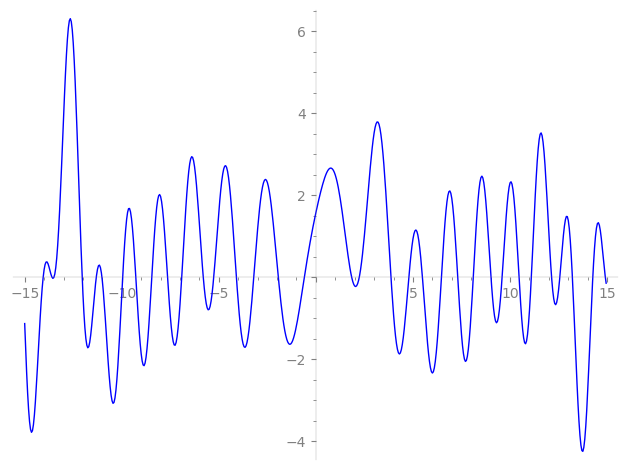| L(s) = 1 | + 1.05·5-s + (1.79 − 1.94i)7-s − 6.24i·11-s + (−0.872 + 0.503i)13-s + (−3.26 − 5.66i)17-s + (1.73 + 1.00i)19-s + 4.40i·23-s − 3.88·25-s + (−6.12 − 3.53i)29-s + (−2.07 − 1.19i)31-s + (1.89 − 2.04i)35-s + (−3.64 + 6.30i)37-s + (−1.80 − 3.11i)41-s + (1.60 − 2.78i)43-s + (1.87 + 3.23i)47-s + ⋯ |
| L(s) = 1 | + 0.472·5-s + (0.679 − 0.733i)7-s − 1.88i·11-s + (−0.241 + 0.139i)13-s + (−0.792 − 1.37i)17-s + (0.397 + 0.229i)19-s + 0.917i·23-s − 0.777·25-s + (−1.13 − 0.657i)29-s + (−0.372 − 0.214i)31-s + (0.320 − 0.346i)35-s + (−0.598 + 1.03i)37-s + (−0.281 − 0.487i)41-s + (0.244 − 0.424i)43-s + (0.272 + 0.472i)47-s + ⋯ |
\[\begin{aligned}\Lambda(s)=\mathstrut & 1512 ^{s/2} \, \Gamma_{\C}(s) \, L(s)\cr =\mathstrut & (-0.200 + 0.979i)\, \overline{\Lambda}(2-s) \end{aligned}\]
\[\begin{aligned}\Lambda(s)=\mathstrut & 1512 ^{s/2} \, \Gamma_{\C}(s+1/2) \, L(s)\cr =\mathstrut & (-0.200 + 0.979i)\, \overline{\Lambda}(1-s) \end{aligned}\]
Particular Values
| \(L(1)\) |
\(\approx\) |
\(1.576412023\) |
| \(L(\frac12)\) |
\(\approx\) |
\(1.576412023\) |
| \(L(\frac{3}{2})\) |
|
not available |
| \(L(1)\) |
|
not available |
\(L(s) = \displaystyle \prod_{p} F_p(p^{-s})^{-1} \)
| $p$ | $F_p(T)$ |
|---|
| bad | 2 | \( 1 \) |
| 3 | \( 1 \) |
| 7 | \( 1 + (-1.79 + 1.94i)T \) |
| good | 5 | \( 1 - 1.05T + 5T^{2} \) |
| 11 | \( 1 + 6.24iT - 11T^{2} \) |
| 13 | \( 1 + (0.872 - 0.503i)T + (6.5 - 11.2i)T^{2} \) |
| 17 | \( 1 + (3.26 + 5.66i)T + (-8.5 + 14.7i)T^{2} \) |
| 19 | \( 1 + (-1.73 - 1.00i)T + (9.5 + 16.4i)T^{2} \) |
| 23 | \( 1 - 4.40iT - 23T^{2} \) |
| 29 | \( 1 + (6.12 + 3.53i)T + (14.5 + 25.1i)T^{2} \) |
| 31 | \( 1 + (2.07 + 1.19i)T + (15.5 + 26.8i)T^{2} \) |
| 37 | \( 1 + (3.64 - 6.30i)T + (-18.5 - 32.0i)T^{2} \) |
| 41 | \( 1 + (1.80 + 3.11i)T + (-20.5 + 35.5i)T^{2} \) |
| 43 | \( 1 + (-1.60 + 2.78i)T + (-21.5 - 37.2i)T^{2} \) |
| 47 | \( 1 + (-1.87 - 3.23i)T + (-23.5 + 40.7i)T^{2} \) |
| 53 | \( 1 + (-6.02 + 3.47i)T + (26.5 - 45.8i)T^{2} \) |
| 59 | \( 1 + (6.67 - 11.5i)T + (-29.5 - 51.0i)T^{2} \) |
| 61 | \( 1 + (-7.10 + 4.10i)T + (30.5 - 52.8i)T^{2} \) |
| 67 | \( 1 + (0.0613 - 0.106i)T + (-33.5 - 58.0i)T^{2} \) |
| 71 | \( 1 - 5.37iT - 71T^{2} \) |
| 73 | \( 1 + (-14.4 + 8.33i)T + (36.5 - 63.2i)T^{2} \) |
| 79 | \( 1 + (-4.43 - 7.67i)T + (-39.5 + 68.4i)T^{2} \) |
| 83 | \( 1 + (-1.07 + 1.86i)T + (-41.5 - 71.8i)T^{2} \) |
| 89 | \( 1 + (-2.23 + 3.86i)T + (-44.5 - 77.0i)T^{2} \) |
| 97 | \( 1 + (-0.960 - 0.554i)T + (48.5 + 84.0i)T^{2} \) |
| show more | |
| show less | |
\(L(s) = \displaystyle\prod_p \ \prod_{j=1}^{2} (1 - \alpha_{j,p}\, p^{-s})^{-1}\)
Imaginary part of the first few zeros on the critical line
−9.276217182989721983068993621800, −8.453688429296484330183927403367, −7.64089069431536652649357234537, −6.91104736211922757562688882628, −5.80144515686492004459540821413, −5.26287168053825025429324867653, −4.09501923667778530276902966221, −3.20044030527623932560835073469, −1.93537690202619705265437441074, −0.59442165330644210035610788178,
1.84249027818995275449931319339, 2.23428221540792058321919368489, 3.86744298360562981433153865850, 4.78842448868608835817015971479, 5.48646811303963476504347309169, 6.46550684963218043095110366574, 7.30545999913212469215290001912, 8.105675494672506965062293685081, 9.018822512603669822891565957100, 9.591172901863593481938045816692

